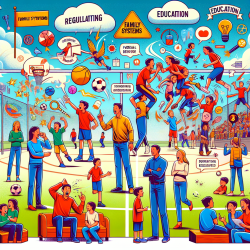As a speech-language pathologist dedicated to data-driven decision-making, I am excited to share insights from a fascinating research study on determiner phrase production in French-speaking children with Developmental Language Disorder (DLD). The study, titled "Elicited and Spontaneous Determiner Phrase Production in French-Speaking Children With Developmental Language Disorder," provides valuable findings that can significantly enhance our practice and outcomes for children.
Understanding the nuances of determiner phrase production in children with DLD is crucial for developing effective therapeutic interventions. This research contrasts elicitation and spontaneous speech data in French-speaking children with DLD and their typically developing peers, focusing on determiner phrase and gender agreement.
Key Findings
The study involved eight French-speaking children with DLD and age-matched or language-matched controls. The researchers employed an elicitation task for complex noun-phrases with one or two adjectives and analyzed a spontaneous speech sample of 200 utterances containing determiner phrases. Here are the main findings:
- Elicitation vs. Spontaneous Speech: Elicitation tasks revealed specific difficulties with adjective agreement and high levels of global error in children with DLD. In contrast, spontaneous speech samples showed mostly omission and substitution errors, often on determiners.
- Gender Agreement: The study found that children with DLD struggled with gender agreement in determiner phrases, particularly with feminine forms. This difficulty was more pronounced in elicitation tasks.
- Complementary Approaches: Both elicitation and spontaneous speech approaches are complementary. Elicitation tasks are particularly useful for rapid identification of difficulties with determiner phrases and agreement.
Implications for Practice
As practitioners, we can leverage these findings to improve our assessment and intervention strategies:
- Incorporate Elicitation Tasks: Use elicitation tasks to quickly identify specific difficulties with determiner phrases and gender agreement in children with DLD. These tasks can provide a clearer picture of a child's language abilities than spontaneous speech samples alone.
- Focus on Gender Agreement: Pay special attention to gender agreement, especially with feminine forms, during therapy sessions. Targeted exercises can help children with DLD improve their accuracy in this area.
- Use Complementary Methods: Combine elicitation tasks with spontaneous speech analysis to gain a comprehensive understanding of a child's language abilities. This dual approach can help tailor interventions more effectively.
Encouraging Further Research
While this study provides valuable insights, further research is essential to deepen our understanding of determiner phrase production in children with DLD. Larger sample sizes and diverse linguistic contexts can help validate and expand upon these findings.
To read the original research paper, please follow this link: Elicited and Spontaneous Determiner Phrase Production in French-Speaking Children With Developmental Language Disorder.
By staying informed and incorporating research-based practices, we can continue to make a positive impact on the lives of children with DLD. Let's embrace the power of data-driven decisions to create great outcomes for the children we serve.










